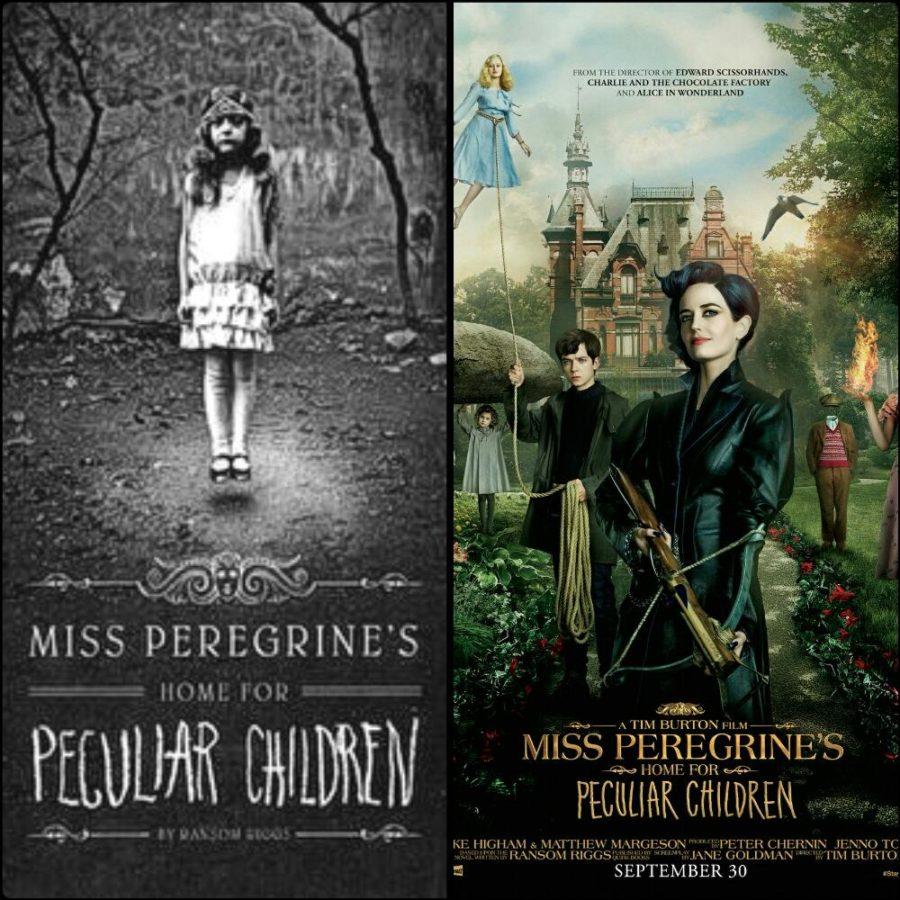Miss Peregrine’s Home for Peculiar Children: A movie with no magic
graphic courtesy of Emily Reed
A comparison of Miss Peregrine’s Home for Peculiar Children, book v. movie.
October 17, 2016
Miss Peregrine’s Home for Peculiar Children by Ransom Riggs took the literary world by storm when it was released in America in June, 2011. After only one book, readers fell in love with the series, and the following two novels had fans head-over-heels.
The story follows Jacob Portman after the death of his beloved grandfather. Desperate for closure, Jacob journeys to the children’s home off the coast of Wales where his grandfather was raised. However, he soon realizes that the house is populated by magical children, known as Peculiars, living agelessly in a time loop. And they need his help.
Now, with the trilogy complete, Miss Peregrine’s Home for Peculiar Children has been adapted for the big screen. However this is a movie that can only be enjoyed by someone who has never read the series.
I’m a fan of director Tim Burton’s work. Nightmare Before Christmas, Coraline, and Alice in Wonderland are all brilliant movies with a healthy dose of whimsy. Burton’s latest work on Miss Peregrine’s was no different.
The movie’s scenery is phenomenal. From the plain beige walls of Jacob’s everyday life to the ivy crawling through the decrepit children’s home, Burton transports viewers to the Peculiar world. The pacing at the beginning was a little too fast, but Burton made up for it with his grotesquely animated hollowghast.
Sadly, the movie has a major flaw: it’s nothing like the book.
In the lovable trilogy, Emma Bloom is a brash girl with fire at her fingertips. Olive is a child who is lighter than air. Burton not only switched these characters’ abilities, but he also made Olive the same age as Emma.
In the film, Olive was suddenly a teenage girl with fiery passion. Enoch, another Peculiar teen, became this originally pre-pubescent girl’s love interest. While this pairing fit well with the context of the movie, it was a far cry from the original series.
Miss Peregrine’s main character is Jacob Portman, a peculiar boy who thinks he’s normal. Burton changed the character’s name to Jake, for no apparent reason.
The movie had other inconsistencies as well. Fiona, who is canonically mute, became quite the Chatty Cathy. Bronwyn, a girl with incredible strength and originally a ‘mother-figure’ to the other children, couldn’t have been more than eight.
The movie also concluded the entire trilogy in a single movie. The Peculiar children not only save Miss Peregrine and her fellow ymbrynes, but also foil the series’s main villain, Baron.
Baron himself is another issue. While the character is excellently portrayed by Samuel L. Jackson, he is also the only person of color in the entire movie. It is the least diverse cast I’ve seen in ages.
Watching the movie, I got the feeling that Burton had read the first few chapters of the book and then decided to make up the rest. Pulling out all the stops, he created an English carnival, an army of skeletons, and an ancient sunken boat.
In his defense, he may have flipped to the end, read the word ‘boat’ and mistook the small canoes described by Riggs for a massive warship.
Ignoring the fact that the movie is supposed to be an adaptation of the book and that there is only one person of color, Miss Peregrine’s Home for Peculiar Children is a decent movie. It has action, intriguing characters, and a dose of fantasy.
If you’re expecting the original book brought to the screen, you’ll be sorely disappointed. If you want to see a decent fantasy movie, and you’ve never read the original book series, go ahead! You might enjoy it.
Personally, however, as a long time fan of the original series, I couldn’t get past Jacob’s new name.



